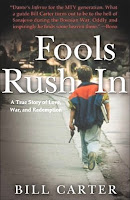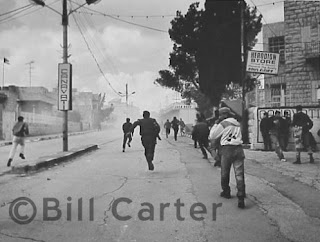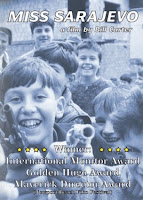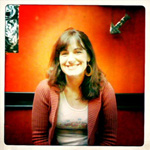Fools rush in (where angels fear to tread)
During the hellishness of living in a war zone, what can music possibly bring to the equation? Through its primal power, can it be a hand to reach out and pull us away?
 When the Bosnian War and the siege of the city of Sarajevo was unfolding in the early Nineties, I never could wrap my mind around the ethnic cleansing, the infighting, the murders of civilians under the auspices of war. It all seemed so very far removed from my world (despite my grandmother being full-blooded Yugoslavian).
When the Bosnian War and the siege of the city of Sarajevo was unfolding in the early Nineties, I never could wrap my mind around the ethnic cleansing, the infighting, the murders of civilians under the auspices of war. It all seemed so very far removed from my world (despite my grandmother being full-blooded Yugoslavian).
After just finishing Bill Carter‘s book Fools Rush In, it still doesn’t make full sense to me what was causing the bombing and sniping and destruction between neighbors Serbs, Croatians, Bosnians, Bosnian-Serbs, Bosnian-Croats, Bosnian Muslims – like one of those spin-the-wheels color combination games — how many combos can we come up with that can kill each other? Then again I don’t know how much sense it made to anyone involved, inside the city or outside looking in (or outside ignoring it).
Bill Carter is a twenty-something from the West Coast who begins his journey into the Bosnia region as a man unmoored. From his earliest memories of abuse at the hands of a terrifying, nauseating, damaged father, he begins his book by telling of his lifelong gravitational pull to places half a world away. He remembers getting a map of the world in National Geographic magazine as a child growing up in California’s Central Valley:
“I stuck the world, measuring three feet by five, on the wall next to my bed with a few strips of tape. At night, on the top bunk, I would secretly stretch out across the world. If I extended fully I could put my toes in the jungles of Sumatra, my navel at the tip of Argentina and my head in the Indian Ocean. Most nights I would place an ear against the the map, my hot flushed cheek touching the imaginary cool deep waters of the Pacific Ocean. I think I was listening for the sound of breaking waves. Instead most nights sounded the same.”
When he reaches his early twenties, he finds a temporary harbor of amazing intensity in Santa Cruz in the arms of a girl named Corrina who fills exactly one year of his life with fervor and heat, understanding and laughter. His writing about his relationship with her held my nerve endings up against a white-hot flame, reminiscent of how Rob Sheffield wrote about Renee in Love Is A Mix Tape only with more grit and sexual honesty.
After losing Corrina, Carter’s trajectory spins him to a war zone on a humanitarian mission. I felt like he was searching to numb the pain inside of him by immersing himself in even greater pain around him. Life in the seven-mile-by-one-mile oval of land in the heart of Sarajevo is under siege — a killing zone from snipers in the hills and in the tall buildings, shooting at anything that dares to move. But Carter finds that people do dare to move; they dare to play blues music and rock ‘n’ roll in clubs where you have to duck your head and run from the incoming shrapnel to get in the dusty side door. They dare to hold art gallery openings and go dancing. They share meals in their homes (away from the vulnerability of the glass windows), they laugh, they make love — and live in the moment because tomorrow may actually never come.
As Carter says in an interview on Dutch television, “When I got there, it didn’t take very long for me to realize that this place was … timeless. When you entered Sarajevo, in that war, you entered a time zone. There was no past, no future. The past is gone, it’s obliterated. The future is how much longer I have to sit here with you before a bomb comes in the window. So what we have is right now. I was living right in the moment, which was a huge relief for me.”
 Carter fills his days with distributing food through a French group called The Serious Road Trip, lives in a bombed-out office tower in the center of Sarajevo, and they occupy many nights sitting around drinking cheap Eastern European vodka mixed with powdered lemonade, trying to make some sense of what is going on all around them. Carter’s journey in this book is honest, and reeling, and confessional. All the foreigners in this story seem, to some degree, to be trying to find a home and a purpose and a community on the other side of the world.
Carter fills his days with distributing food through a French group called The Serious Road Trip, lives in a bombed-out office tower in the center of Sarajevo, and they occupy many nights sitting around drinking cheap Eastern European vodka mixed with powdered lemonade, trying to make some sense of what is going on all around them. Carter’s journey in this book is honest, and reeling, and confessional. All the foreigners in this story seem, to some degree, to be trying to find a home and a purpose and a community on the other side of the world.
Carter’s hesitation mixes with the brashness that we are so prone to in our twenties; the hubris pressed hot against the earnestness, with the passions all bleeding red into our uncertainty. One other Serious Road Trip member remarks to Carter one night, “I am beginning to believe the worst part of being here is knowing this might be the best thing I ever do in my life. I mean I’m only twenty-six. What am I supposed to do for the rest of it?“
Dealing with the death all around them, Carter appraises his own pale flesh in the mirror one night and writes, “Sometimes I think it is easy to forget we have blood in us until it starts to leak out.” He loses friends and acquaintances to the war, and in between his humanitarian work he photographs the people he meets and the horrors (and joys) that he sees each day.
Then one night he arrives upon a whim that can only be described as ludicrous, but that plays out into a surreal reality. Carter wants the world to know what is going on in this strip of land that seems to have been forgotten by the international community, rendered invisible by the political double-speak and the obscurity of another war, another country. Not my problem. For some reason he thinks of U2. He thinks that U2 might understand and sympathize with what is happening in Sarajevo because of the parallels between their own Irish history and their passion for social justice. And amazingly enough, Carter calls it right.
 A big part of this story then also becomes the relationship he forms with U2 from the center of this bombed-out city, and the way he is ultimately able to connect the Sarajevans and their stories with hundreds of thousands of European concertgoers attending the ZooTV Tour in 1993 via live satellite. The Edge and then Bono relate with what Carter is experiencing and filming, and the result becomes the award-winning documentary Miss Sarajevo, for which U2 pens a song by the same name. The double-edged sword of pop celebrity here becomes an asset through which people begin to take notice of the slaughter, setting into motion a chain of awareness and events that seem to ultimately help quell the horror in Sarajevo through NATO action.
A big part of this story then also becomes the relationship he forms with U2 from the center of this bombed-out city, and the way he is ultimately able to connect the Sarajevans and their stories with hundreds of thousands of European concertgoers attending the ZooTV Tour in 1993 via live satellite. The Edge and then Bono relate with what Carter is experiencing and filming, and the result becomes the award-winning documentary Miss Sarajevo, for which U2 pens a song by the same name. The double-edged sword of pop celebrity here becomes an asset through which people begin to take notice of the slaughter, setting into motion a chain of awareness and events that seem to ultimately help quell the horror in Sarajevo through NATO action.
Carter’s book is about a quest for redemption; for a people, for a city, for himself. It’s a riveting read on so many levels, saturated with feelings and uncertainties that I could absolutely relate to even though I’ve never lived in something like he describes. I was encouraged how one confused, passionate, grieving, flawed twenty-something started a rumble about an injustice in this world, even as he struggled with so many things. He captures a rare joy in this story. And plus, the book mentions Pearl Jam two times, so you know, it’s clearly worth it for that alone. Pick it up here and read a U2-related excerpt here.
Sunday Bloody Sunday (live in Sarajevo) – U2
The Sarajevans invite U2 to play Sarajevo and Bono seems ready to go in immediately, but is reined in through the obvious security concerns. It takes four years, but they eventually come to Sarajevo in 1997 on the PopMart tour
Miss Sarajevo (live in Milano) – U2
Bono sings the Italian lyrics here instead of Pavarotti; a gorgeous song with the Universal Declaration of Human Rights read over the ending
Angel – Pearl Jam
This is just a Heather-addition, a song not mentioned anywhere in the book but one that fits this story as perfectly as if it were part of the official soundtrack, on so many levels. Listen to it as accompaniment to reading, and tell me I’m not crazy



 Name: Heather Browne
Name: Heather Browne
Haven’t read the book, but will definitely pick it up. While it’s not music related, if you enjoyed the genre, pick up “My War Gone By, I Miss It So” by Anthony Loyd. I’ve read it, literally, a dozen times. Like the saying goes, everybody could write one good book and this one is his one and only. His prose, while sometimes off, more often than not strikes the mark exactly and conveys what much of living in Sarajevo must have been like at the time. The description of being locked inside basement clubs from dusk till dawn and the vibe that was contained bewteen those concrete walls during those brief respites from time is enough to make me read the damn thing again and again… Anyway, for what it’s worth, one of the best books ever written. Yup… I said it. Disagree if you will, but I’ll believe it till I go to my grave.
Anonymous — November 29, 2007 @ 4:56 pm
i loved this book, and i’m glad to see that other people are aware of it. i would love to see bill carter’s documentary, but it doesn’t seem to be available anymore. thanks for posting about this!
jayme — November 29, 2007 @ 8:15 pm
Jayme, you can paypal buy it from his site for $18 using the link in the post:
http://www.billcarter.cc/mainpages/films.htm
I am tempted.
heather — November 29, 2007 @ 8:49 pm
I must read this book. I have never been able to wrap my mind around this issue, or others like it, either. I have a friend that went to Kosovo after all this crap went down and he fell in love with the people and has been working on a documentary film of it for years.
Barbara (aka Layla) — November 29, 2007 @ 11:26 pm
I picked up the book for the U2 connection, but absolutely loved it the whole way through. I keep meaning to go and pick up a copy of the DVD from his website; maybe I’ll buy myself another Christmas present!
Alicia — November 30, 2007 @ 10:35 pm
I recommend Bill Flanagan’s “U2 at the End of the World” for everything in it (it’s a chronicle of the band during the early ’90s), including some very good passages about Carter’s satellite linkups with the Zoo TV tour.
Michael in Nashville — December 9, 2007 @ 10:07 pm
did you see Bill Carter posted his reaction to the capture of Radovan Karadzic on the Fools Rush In myspace? http://www.myspace.com/foolsrushinbook
Cheers!
The Fenbi International Superstars — July 22, 2008 @ 1:08 pm
hy! I didn’t understand well how many female character in the novel are there? and how strong?? I’m so intu this book…………….:=)
tnx!!!!
Anonymous — August 12, 2008 @ 10:18 am